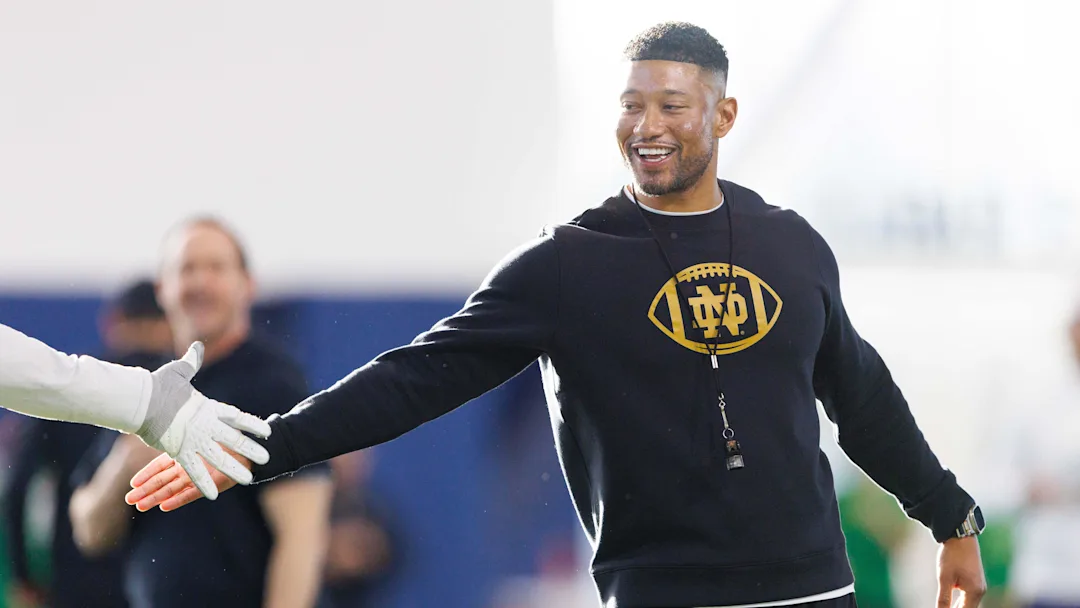The world of college football is one of perpetual motion. Trends rise and fall, programs flourish or fade, and recruiting—the lifeblood of every powerhouse—can shift dramatically with a single season’s success or failure. At Notre Dame, the latter half of that equation has been playing out in full force. Since their thrilling run to the College Football Playoff National Championship Game, Marcus Freeman’s Fighting Irish have turned heads across the country—not just with their play on the field, but with a recruiting renaissance that few could have predicted just a year ago.
Freeman, now entering his fourth season as the head coach in South Bend, is overseeing one of the most aggressive and fruitful recruiting stretches in recent Notre Dame history. The team’s dramatic march to the national title game reignited national interest in the program, and Freeman has capitalized. The result? A wave of elite talent pledging allegiance to the Golden Dome, and a sense that Notre Dame might not be content with merely contending anymore—they’re building to dominate.
For Freeman, the recruiting surge is not an accident. It’s the product of long hours, an obsessive commitment to relationship-building, and a philosophical shift that’s been slowly redefining what Notre Dame football means in the modern era.
“It’s not just about stars and rankings,” Freeman said recently. “It’s about finding the right fit—guys who are hungry, who want to win, who understand the standard here. But yeah, when you show that you can compete at the highest level, it changes the conversation with a lot of those top recruits.”
Indeed, the conversation has changed. Notre Dame is suddenly landing five-star prospects that once seemed destined for the SEC. Quarterbacks, wideouts, edge rushers, and corners who previously wouldn’t have given South Bend a second glance are now scheduling official visits, flying in families, and calling Freeman and his staff with eager anticipation.
A major turning point came in the weeks following the Irish’s narrow loss in the national title game—a hard-fought, high-drama contest that ended in heartbreak but showed that Freeman’s team belonged among college football’s elite. Within days of the final whistle, Notre Dame’s phones lit up.
“There was just this momentum,” Freeman said. “It felt like the world was watching us and saying, ‘Wait a second—Notre Dame might be back.’ And for recruits, especially the ones who want to win and make a name for themselves, that was huge.”
It helped that Freeman had laid the foundation well before the national title run. His ability to connect with players and their families has become a defining trait. Whether in living rooms or on FaceTime calls, he speaks with authenticity and clarity. He doesn’t sugarcoat the challenges of playing at Notre Dame—the academic rigor, the national spotlight, the expectations—but he sells the dream with a conviction that’s hard to resist.
And now, he has a playoff run to back up every promise.
Take, for example, the recent commitment of five-star defensive lineman Jamal Carter, the No. 2 overall player in the 2026 class. A Georgia native with offers from Alabama, Georgia, and Ohio State, Carter stunned the recruiting world by choosing Notre Dame.
“Coach Freeman just kept it real,” Carter said during his announcement. “He didn’t promise me anything except the chance to be great. I watched what they did this year. I want to be a part of that.”
It’s a sentiment echoed by multiple commits in recent months. Notre Dame’s current 2026 recruiting class ranks in the top three nationally—a position the program hasn’t held since the Lou Holtz era. And it’s not just the blue-chip talent. There’s depth. There’s balance. And most of all, there’s belief.
Freeman is quick to deflect credit to his staff, emphasizing the tireless work of assistants like Mike Mickens, Al Washington, and Gerad Parker. But make no mistake—the vision starts with Freeman. From day one, he’s set out to redefine what recruiting looks like in South Bend, marrying tradition with innovation.
“We’re always going to respect the history here,” Freeman said. “But we’re not going to be stuck in the past. This is a new era. And these kids today, they want to see that you can win now, that you’re serious about development, about NIL, about preparing them for the NFL. So we’re evolving.”
The evolution is evident in every corner of the program. Freeman has embraced social media in a way few Notre Dame coaches ever have, often posting behind-the-scenes looks at campus visits, workouts, and film sessions. He’s leaned into NIL opportunities, making sure recruits understand the brand power of the Notre Dame name. And he’s relentlessly pursued upgrades to the team’s facilities, ensuring that South Bend doesn’t lag behind the arms race dominating the national landscape.
But perhaps most importantly, Freeman has cultivated a culture that resonates with recruits—and their parents. It’s competitive, yes, but also grounded in accountability, maturity, and brotherhood.
“You walk into that locker room, and you feel it,” said Chris Stewart, the father of four-star linebacker commit Tyson Stewart. “It’s not fake. These guys are locked in. They love each other. They respect the coaches. And they believe they’re building something special.”
Notre Dame’s recruiting hot streak also reflects a larger truth in college football: winning still matters. While NIL deals and transfer portal promises dominate headlines, prospects still flock to programs that prove they can compete at the highest level. And Notre Dame, with Freeman at the helm, has done just that.



